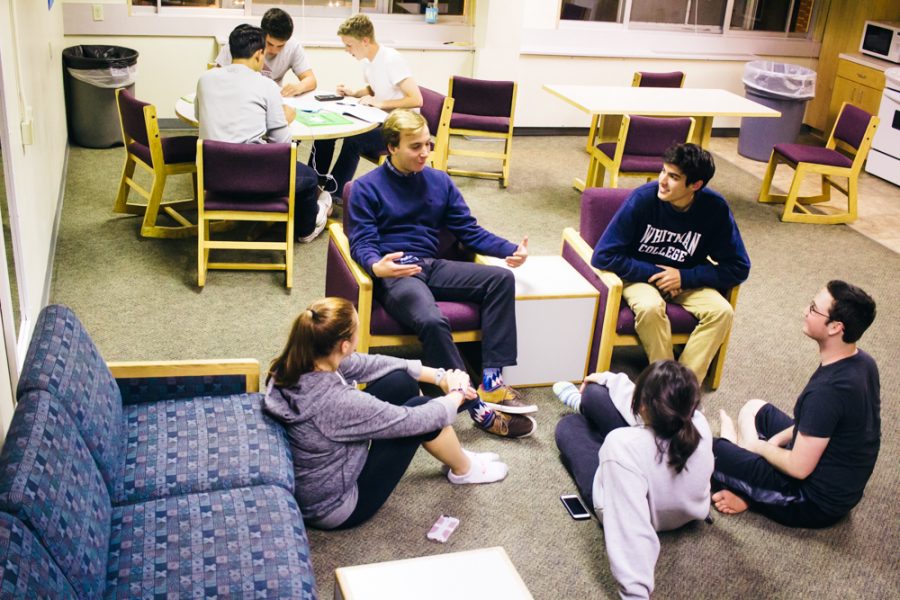Mixed Gender Housing Debated at Cookies and Controversy
October 5, 2016
The Whitman community participated in a discussion this past week about the benefits and drawbacks of mixed-gender housing.
This discussion took place at a Cookies and Controversy event, organized by Resident Directors of Anderson and Jewett, Luke Hampton and Brian Glickman. The discussion, formally titled, “The Debate of Same vs. Mixed-Gender Living” was led by Assistant Professor of Psychology Erin Pahlke. The discussion covered the psychological questions of living in same gender or mixed gender housing situations. “Mixed-gender housing” can be an ambiguous term, but for this discussion it referred to the setup on the fourth floor of Jewett, with every other room switching off from male to female. Students met this past Saturday night in the main lounge of Jewett to talk about their opinions on changing more of Whitman’s residencies to look like the fourth floor of Jewett. Many students favored offering more mixed gender living options, some of the reasons being it de-emphasizes the difference between the genders and creates a more inclusive atmosphere in the residence halls.
Pahlke, whose specialty involves research on single gender schooling, spoke about her intent in leading the discussion at Cookies and Controversy. She facilitated the discussion by framing questions that caused students to see both sides of the argument, for and against mixed gender housing.
“I tried, over the course of the hour, to get people to think about potential benefits or drawbacks of having single versus mixed gender housing. I framed it in terms of the sorts of debates people have about single sex schooling,” Pahlke said.
While both sides of the issue were discussed, the student opinion seemed to favor having the option for mixed gender living.
“People really considered the issues on both sides, and it felt like we had a good, productive conversation, but [mixed gender housing] seemed to be overwhelmingly the more supported opinion,” Anderson Resident Director Luke Hampton said.
One argument that was made in support of mixed gender housing focuses more on the gaps between genders that single gender living creates.

“By making different floors, saying women will live over here and men will live over there, could it be that what you’re doing is emphasizing differences between men and women?” Pahlke said.
Pahlke also spoke about how the barriers to mixed gender living might not be as large as we think–using the Gender Similarities Hypothesis from the field of psychology. This hypothesis would support the push for mixed-gender living because less differences between the genders means an easier transition to mixed-gender housing.
“One question is, how big is the difference, really, between men and women? One of the things we talk about in psychology is something called the Gender Similarities Hypothesis–which is basically the idea that the actual difference between men and women is quite a bit smaller in our world than we think it is,” Pahlke said.
There were many valid points to be made about single gender living, however. Living in a single gender dorm can provide a safer space for individuals than mixed gender dorms, and provides a place where it’s possible to focus less on your own gender.
“Is it possible that being in an all female hall allows you to no longer think about gender as a salient portion of your identity for that time when you’re in the hall? For example, you don’t have to worry as much about body image objectification issues,” Pahlke said. “Single gender housing promotes safe spaces for individuals in the face of experiences with sexism or gender stereotypes.”
This discussion around mixed gender residence halls seems to have one goal in mind: make people comfortable in their residence and establish a focus on inclusivity. This discussion affects all of Whitman–including the new sophomore dorm being built.
A faculty member of the committee for the new residence hall and Professor of Sociology, Michelle Janning, spoke about the necessity of inclusivity in living spaces on campus.
“When the committee met, we had really thoughtful and rigorous discussions about the benefits and drawbacks of mixed gender housing…Importantly, in our discussion, we maintained a focus on community-building and allowing for inclusivity. That makes sense, given the focus on dismantling the gender binary,” Janning said in an email to the Whitman Wire.






